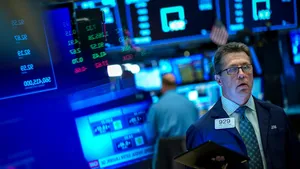Deciphering the European Market: A Deep Dive into Daily Stock Index Fluctuations (Meta Description: European stock market, DAX30, FTSE 100, CAC40, STOXX 50, index fluctuations, market analysis, investment strategy)
Imagine this: you're an investor, eyes glued to the fluctuating numbers on your screen, the fate of your portfolio hanging in the balance. The European market, a complex tapestry of economic forces and global interconnectedness, can feel like a wild rollercoaster. One day, it's soaring highs; the next, a dizzying plummet. Understanding the nuances of this dynamic landscape is crucial for navigating the often turbulent waters of international investment. This isn't just about dry statistics and technical jargon; it's about deciphering the human element – the hopes, fears, and collective decisions that shape the daily movements of indices like the DAX30, FTSE 100, CAC40, and STOXX 50. We'll peel back the layers, exploring the underlying factors that influence these powerhouses of the European economy, providing you with a clear, concise, and actionable understanding of the forces at play. Forget the cryptic analyst reports and confusing financial news – we’ll cut through the noise and empower you with the knowledge you need to make informed investment decisions. Get ready to unlock the secrets of the European market and become a more savvy, confident investor. This isn't just another market report; it's your guide to mastering the European financial landscape. We’ll go beyond the headlines, exploring the "why" behind the "what" – the human story behind the numbers. So, buckle up, because we're about to embark on a fascinating journey into the heart of the European stock market!
European Stock Market Indices: A Detailed Overview
The European stock market, a behemoth of global finance, boasts several key indices reflecting the performance of its various national economies. Let's dissect the major players:
-
DAX30 (Germany): The DAX30, often referred to as the German blue-chip index, tracks the 30 largest and most liquid German companies listed on the Frankfurt Stock Exchange (FSE). Think of it as a barometer of Germany's overall economic health. A dip in the DAX30 often signals concerns about the German economy, which, given its size, can ripple across Europe.
-
FTSE 100 (UK): The FTSE 100, or "Footsie," represents the 100 largest companies listed on the London Stock Exchange (LSE). It's a reflection of the UK's economic performance, often influenced by global events and Brexit-related factors. Keep in mind, the FTSE 100's composition can shift based on company performance, making it a dynamic indicator.
-
CAC 40 (France): The CAC 40, France's benchmark index, tracks the 40 largest French companies listed on Euronext Paris. Its performance is influenced by French economic conditions, as well as broader European and global trends. This index offers a glimpse into the powerhouse of the French economy and its global standing.
-
STOXX 50: This pan-European index tracks the 50 largest and most liquid companies across 19 Eurozone countries. It provides a broader perspective on the overall health of the Eurozone economy, offering a more comprehensive view than focusing on individual national indices. It's a great tool for assessing the overall Eurozone market performance.
Table 1: Recent Performance of Major European Indices (Illustrative Data – Always check current values)
| Index | Date | Closing Value | Change (%) |
|-------------|-----------|----------------|------------|
| DAX30 | Dec 18 | 14,000 (Example) | -0.17% |
| FTSE 100 | Dec 18 | 7,500 (Example) | -0.82% |
| CAC 40 | Dec 18 | 6,800 (Example) | +0.12% |
| STOXX 50 | Dec 18 | 4,200 (Example) | -0.13% |
Note: The data presented is for illustrative purposes only. Actual values may vary significantly. Always consult up-to-date financial sources for accurate information.
Understanding Market Fluctuations: The Human Factor
So, why the daily dance of ups and downs? It's rarely a simple answer. While macroeconomic factors play a significant role – interest rates, inflation, geopolitical events, etc. – the human element is just as critical. Investor sentiment, fueled by news, speculation, and market psychology, can cause significant swings. A single negative headline, for instance, can trigger a wave of selling, leading to a temporary dip in the index. Conversely, positive news or promising economic data can boost investor confidence, leading to a rally.
Think of it like a flock of birds. Individual birds may react to slight changes in wind or the movement of other birds. Collectively, their seemingly random movements create a larger, more predictable pattern. The same is true for investors. Individual decisions, based on personal assessments of risk and reward, collectively shape market trends.
Key Factors Influencing European Stock Market Performance
Several intertwined factors contribute to the daily performance of European stock indices. These include:
-
Geopolitical Events: Global instability, political uncertainty, and international conflicts can significantly impact investor confidence, causing market volatility. Think Brexit, the war in Ukraine – these events all have had (and continue to have) substantial impacts.
-
Economic Data Releases: Key economic indicators like inflation rates, unemployment figures, and GDP growth significantly influence market sentiment. Positive data often leads to increased investment, while negative data can trigger sell-offs.
-
Interest Rate Changes: Central bank decisions on interest rates profoundly affect borrowing costs and investment decisions. Rising interest rates can dampen economic activity, while lower rates can stimulate growth.
-
Company-Specific News: Individual company performance, announcements, and earnings reports can have a significant impact on their stock prices and, in turn, on the overall index. A major corporate scandal or unexpected profit surge can cause ripple effects.
-
Global Market Trends: The European market is deeply intertwined with global financial markets. Events in the US, Asia, or other regions can significantly impact investor sentiment and market performance. A downturn in the US market, for example, often spills over into Europe.
Frequently Asked Questions (FAQs)
Q1: How can I invest in European stock markets?
A1: You can invest through various channels, including online brokerage accounts, mutual funds specializing in European equities, or exchange-traded funds (ETFs) that track specific European indices. Always ensure you understand the risks involved before investing.
Q2: Are European stock markets riskier than other markets?
A2: All markets carry risk, but the European market presents its unique challenges. Geopolitical factors, economic volatility within the Eurozone, and currency fluctuations all contribute to the risk profile. Diversification is key to mitigate risk.
Q3: What are the best times to invest in the European market?
A3: There's no magic formula. Market timing is notoriously difficult. A long-term investment strategy, based on thorough research and risk tolerance, is generally recommended over trying to “time the market.”
Q4: How do I stay informed about European market movements?
A4: Reliable financial news sources, market analysis websites, and reputable investment platforms provide real-time updates and analyses. Staying abreast of economic indicators and geopolitical events is also crucial.
Q5: What is the role of the European Central Bank (ECB)?
A5: The ECB plays a pivotal role in setting monetary policy for the Eurozone. Its decisions on interest rates and other monetary tools significantly influence the performance of European stock markets. Understanding the ECB's actions is essential for informed investing.
Q6: Are there any resources to help me learn more about European stock markets?
A6: Many reputable financial websites, books, and educational courses provide in-depth information on investing in European stock markets. Seek out sources from established financial institutions and academics.
Conclusion
Navigating the European stock market requires a blend of knowledge, patience, and a healthy dose of risk management. Understanding the underlying factors that influence market movements, combined with a well-defined investment strategy, will significantly increase your chances of success. Remember, this is a marathon, not a sprint. Continuous learning and adapting to market conditions are essential elements of successful long-term investing. Don't get swept away by short-term fluctuations; focus on your long-term goals and stay informed. The European market presents both challenges and opportunities; armed with the right knowledge, you can confidently navigate the exciting world of European investment.



